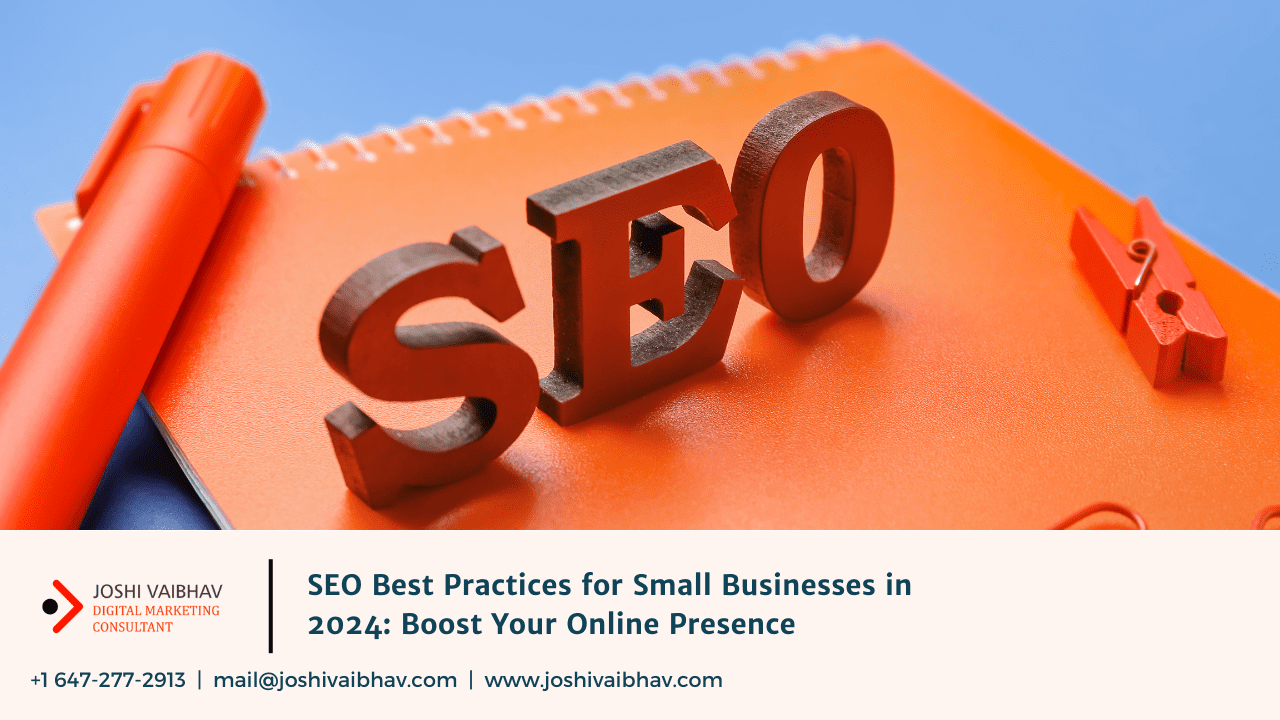Introduction
SEO Best Practices for Small Businesses in 2024 – In today’s digital age, having a robust online presence is crucial for small businesses. SEO, or Search Engine Optimization, is one of the most effective ways to ensure your business is visible to potential customers. As we head into 2024, the landscape of SEO continues to evolve, making it essential for small businesses to stay updated with the latest best practices.
Understanding SEO Fundamentals
What is SEO?
SEO stands for Search Engine Optimization, a set of strategies aimed at increasing the visibility of your website on search engines like Google. It involves optimizing various elements of your site to improve its ranking in search engine results pages (SERPs).
How Search Engines Work
Search engines use complex algorithms to determine the relevance and quality of web pages. They crawl and index websites, analyze their content, and rank them based on numerous factors, including keywords, backlinks, and user experience.
Keyword Research and Optimization
Identifying the Right Keywords
Choosing the right keywords is the cornerstone of SEO. These are the terms and phrases your potential customers are typing into search engines. Focus on keywords that are relevant to your business and have a good balance of search volume and competition.
Long-Tail vs Short-Tail Keywords
Long-tail keywords are more specific and usually longer phrases, while short-tail keywords are broader and shorter. Long-tail keywords often have lower competition and higher conversion rates, making them valuable for small businesses.
Tools for Keyword Research
Utilize tools like Google Keyword Planner, Ahrefs, and SEMrush to find and analyze keywords relevant to your business. These tools provide insights into search volume, competition, and related keywords.
On-Page SEO Strategies
Optimizing Title Tags and Meta Descriptions
Title tags and meta descriptions are critical for on-page SEO. They should be compelling and include your target keywords to attract clicks from search engine users.
Importance of Header Tags
Header tags (H1, H2, H3, etc.) help organize your content and make it easier for search engines to understand. Use them to highlight important sections and include keywords where relevant.
Content Optimization
Keyword Density
While it’s important to include keywords in your content, avoid overstuffing them. Aim for a natural keyword density that enhances readability and relevance.
LSI Keywords
Latent Semantic Indexing (LSI) keywords are terms related to your main keyword. Including these in your content helps search engines understand the context and improves your ranking potential.
Image Optimization
Alt Text
Alt text describes the content of an image and is used by search engines to index images. Make sure to include descriptive, keyword-rich alt text for all your images.
File Names
Optimize image file names by including relevant keywords. Instead of generic names like “image1.jpg,” use descriptive names like “blue-widgets.jpg.”
Technical SEO Essentials
Website Speed and Performance
A fast-loading website enhances user experience and improves your search engine ranking. Use tools like Google PageSpeed Insights to identify and fix performance issues.
Mobile-Friendliness
With the majority of searches now conducted on mobile devices, having a mobile-friendly website is crucial. Ensure your site is responsive and provides a seamless experience across all devices.
Secure Sockets Layer (SSL)
SSL certificates encrypt data transferred between your website and its users, enhancing security and trust. Search engines also favor secure sites, so ensure your site uses HTTPS.
XML Sitemaps and Robots.txt
An XML sitemap helps search engines index your website more efficiently, while a robots.txt file controls which pages should not be indexed. Both are essential for optimal SEO performance.
Local SEO for Small Businesses
Google My Business Optimization
Claim and optimize your Google My Business listing. Ensure your business information is accurate and complete, including your address, phone number, and hours of operation.
Local Citations
Local citations are mentions of your business on other websites, such as directories and review sites. Consistent and accurate citations boost your local SEO.
Reviews and Ratings
Encourage satisfied customers to leave positive reviews on Google and other review platforms. High ratings and positive reviews improve your local search ranking and attract more customers.
Localized Content
Create content tailored to your local audience. This could include blog posts about local events, news, or issues relevant to your community.
Content Marketing and SEO
Importance of Quality Content
Quality content is king in the SEO world. It engages your audience, builds trust, and encourages them to take action. Ensure your content is informative, engaging, and valuable to your readers.
Blogging for SEO
Regularly updating your blog with fresh, relevant content can significantly boost your SEO efforts. Blog posts provide opportunities to target new keywords and attract backlinks.
Video Content
Video content is increasingly popular and can improve your SEO. Create videos that are relevant to your audience and optimize them with descriptive titles, tags, and descriptions.
Infographics
Infographics are a great way to present complex information visually. They are highly shareable and can attract backlinks, boosting your SEO.
Link Building Strategies
Importance of Backlinks
Backlinks from reputable websites signal to search engines that your site is trustworthy and authoritative. Focus on acquiring high-quality backlinks to improve your ranking.
Guest Blogging
Guest blogging on reputable sites in your industry is an effective way to build backlinks and reach a wider audience. Ensure your guest posts are high-quality and provide value to readers.
Broken Link Building
Find broken links on other websites and offer your content as a replacement. This not only helps the website owner but also earns you a valuable backlink.
Social Media and Link Sharing
Share your content on social media platforms to increase its visibility and attract backlinks. Engage with your audience to build relationships and encourage sharing.
User Experience and SEO
Importance of UX in SEO
User experience (UX) plays a significant role in SEO. A positive UX keeps visitors on your site longer, reducing bounce rates and increasing engagement.
Navigation and Site Structure
A well-structured site with clear navigation makes it easy for users and search engines to find what they need. Use a logical hierarchy and include internal links to guide users through your site.
Readability and User Engagement
Ensure your content is easy to read and understand. Use short paragraphs, bullet points, and images to break up text and keep readers engaged.
Tracking and Analytics
Setting Up Google Analytics
Google Analytics is a powerful tool for tracking your website’s performance. Set it up to monitor key metrics and gain insights into your audience’s behavior.
Key Metrics to Monitor
Track metrics such as organic traffic, bounce rate, average session duration, and conversion rates. These provide valuable insights into your SEO performance.
Using Data to Improve SEO
Use the data from Google Analytics to identify areas for improvement. Adjust your SEO strategy based on what the data reveals to continually enhance your performance.
Voice Search Optimization
Rise of Voice Search
Voice search is becoming increasingly popular with the rise of smart speakers and voice assistants. Optimizing for voice search is crucial for staying competitive.
Optimizing for Voice Queries
Voice searches are typically longer and more conversational. Focus on natural language and question-based queries when optimizing for voice search.
E-commerce SEO Strategies
Product Page Optimization
Optimize your product pages with detailed descriptions, high-quality images, and customer reviews. Ensure each page targets specific keywords relevant to the product.
User Reviews and Ratings
User-generated content like reviews and ratings not only builds trust but also improves your SEO. Encourage customers to leave feedback on your product pages.
Structured Data Markup
Use structured data markup (Schema.org) to help search engines understand the content of your pages. This can enhance your search listings with rich snippets, increasing click-through rates.
Common SEO Mistakes to Avoid
Keyword Stuffing
Avoid overloading your content with keywords. This can lead to penalties from search engines and negatively impact user experience.
Ignoring Mobile Users
Ensure your website is mobile-friendly. A significant portion of users access the web via mobile devices, and search engines prioritize mobile-friendly sites.
Duplicate Content
Duplicate content can confuse search engines and dilute your ranking potential. Ensure all content on your site is unique and original.
Staying Updated with SEO Trends
Importance of Continuous Learning
SEO is constantly evolving, making it essential to stay updated with the latest trends and best practices. Regularly educate yourself to stay ahead of the competition.
Resources for Staying Updated
Follow reputable SEO blogs, attend webinars, and join industry forums to stay informed about the latest developments in SEO.
Conclusion
SEO is a powerful tool for small businesses looking to enhance their online presence and attract more customers. By following the best practices outlined in this article, you can improve your website’s visibility, drive more traffic, and ultimately, grow your business. Remember, SEO is a long-term investment, and staying updated with the latest trends is key to maintaining your competitive edge.
FAQs
What is the most important aspect of SEO for small businesses?
The most important aspect of SEO for small businesses is understanding and targeting the right keywords. This involves thorough keyword research to identify terms your potential customers are using and optimizing your website to rank for these keywords.
How often should I update my website’s content for SEO?
It’s recommended to update your website’s content regularly. Fresh, relevant content not only keeps your audience engaged but also signals to search engines that your site is active and valuable.
Are backlinks still relevant in 2024?
Yes, backlinks remain a crucial factor in SEO. High-quality backlinks from reputable websites can significantly boost your site’s authority and search engine ranking.
How can I improve my local SEO ranking?
To improve your local SEO ranking, optimize your Google My Business listing, ensure consistent NAP (Name, Address, Phone Number) information across all platforms, gather positive reviews, and create localized content.
What are some free tools for SEO optimization?
There are several free tools available for SEO optimization, including Google Keyword Planner, Google Analytics, Google Search Console, Ubersuggest, and Moz’s Free SEO Tools.





